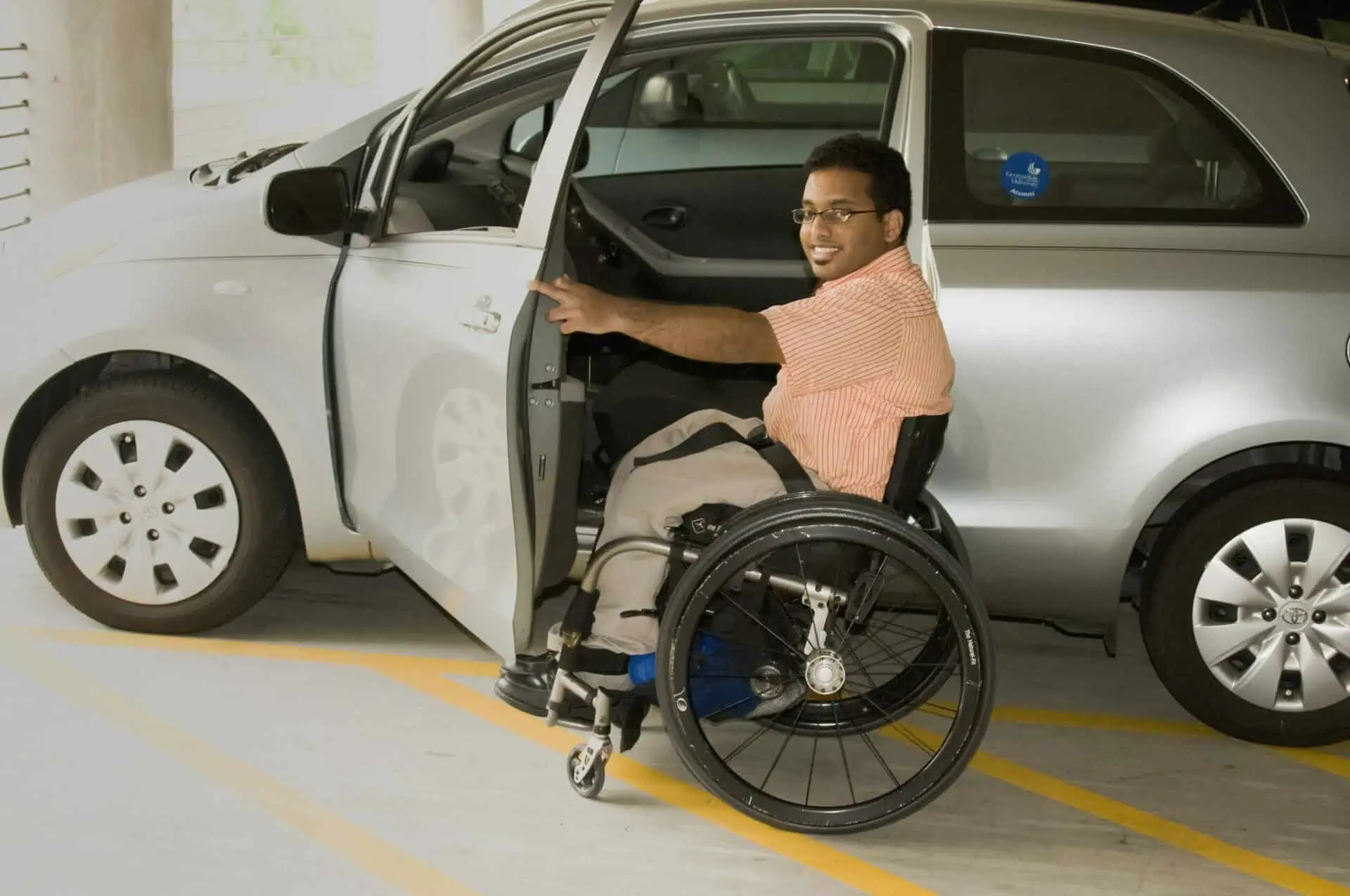Car insurance for disabled drivers is a little different than it is for most people. Drivers with disabilities should additionally consider what it would cost to repair or replace expensive modified cars and vans and valuable adaptive equipment. Here’s what you need to know.
Car Insurance for Drivers With Disabilities and the Affordable Care Act
Under the Affordable Care Act, car insurance companies cannot penalize you just because you have a disability.
The law prohibits unjustified discrimination in all kinds of insurance, in most instances.
But they can charge a higher rate because of your actual claims history – even if your disabilities contributed to one or more of your previous accidents in some way.
Under the Americans With Disabilities Act, insurance carriers may charge a higher premium – or even deny you a policy altogether – if their decision is based on sound actuarial data and principles, and not on speculation.
That is, car insurance companies may charge a higher premium if your disability clearly puts you at a higher risk for accidents on the road.
Car insurance companies may also charge a higher premium if you want them to insure expensive customizations and adaptive technology features on the vehicle itself.
In some jurisdictions, some medical conditions may affect your driver’s license, and you could have limitations on your ability to drive. Doctors can notify your state DMV about your medical conditions, and they can put a limitation or condition on your driver’s license. For example, drivers with vision loss may have a restricted license that prohibits them from driving at night.
If your medical condition requires a physician’s approval to drive, insurance companies can charge you a higher premium on that basis.
Some states require that your driver’s license describe any required adaptive devices on your vehicle.
Ensuring the Value of Modified Cars and Adaptive Technology
If you’ve got adaptive technology on your car, or you have it modified in any way, you should tell your insurance agent. Otherwise, your car will only be insured for the value of an un-modified car. And that could leave you woefully underinsured if your car is damaged, stolen, or destroyed.
According to the National Highway Traffic Safety Administration, the cost of a new car with adaptive devices can easily top $80,000.
The cost of common modifications and adaptive features to accommodate drivers with disabilities generally ranges from about $15,000 to $30,000.
Examples of common adaptive modifications for handicapped drivers include:
- Wheelchair lifts and ramps
- Seatbelt extensions
- Steering knobs
- Hand controls
- Siren detectors
- Automatic doors
- Keyless entry and ignition systems
- Power seats
- Modified or custom mirrors
- Camera and monitor systems
- Specialized car seats
- Swivel seats
If you had to replace your vehicle tomorrow, you’d probably have to replace all the necessary adaptive technology and modifications.
Medicaid is likely to cover just the very basics, and neither Medicaid nor Medicare typically provide full coverage for the cost of a wheelchair van.
Special Coverages for Drivers With Disabilities
If you only have a standard full-coverage car insurance policy for your make and model, that may not provide enough coverage. Just having liability, collision, and comprehensive coverage isn’t enough: If your car were to be destroyed due to a covered hazard or incident, your standard car insurance policy will only cover the value of the car. NOT the extra adaptive equipment and modifications.
So if you own a fairly new Dodge van valued at $40,000, and you’ve installed another $10,000 of adaptive equipment so you can drive it, your standard insurance policy would only cover you up to the value of similar vans of that make and model, age, mileage, and condition, but with no major modifications.
Take out a $1,000 deductible on top of that, and you’d be facing an out-of-pocket cost of at least $11,000.
You’d have to replace all the adaptive equipment.
A lot of people living with disabilities don’t have thousands of dollars lying around.
To fully protect yourself, and make sure you can get your mobility, independence, and lifestyle back that you had prior to the loss of your modified vehicle, you need two kinds of additional coverage.
Adaptive and Special Equipment Coverage
This insurance covers the valuable items and modifications to your vehicle, over and above the value of a similar base make and model in similar condition.
Within this category are two types of coverage: handicapped equipment coverage, and special equipment coverage.
The distinction between the two is important: Handicapped equipment coverage is cheaper but much narrower than special equipment coverage.
Handicapped equipment coverage will cover the basic and obvious extras, such as the installed wheelchair ramp.
If you have more complicated modifications, such as a lowered chassis or a Scott Driving System, you should look for a policy with special equipment coverage.
Mobility car rental coverage
Lots of car insurance policies cover the cost of renting a sedan, van, or truck until your insured vehicle is repaired or replaced.
That might not be sufficient protection for drivers with disabilities. You might need to rent a car or van with special equipment like wheelchair ramps and lifts already installed.
This would naturally be much more expensive than renting an ordinary unmodified car.
Mobility rental car coverage will pay the cost of renting a modified vehicle, so you won’t be out-of-pocket for the additional coverage.
Car Insurance When You Own a Car But Don’t Drive It
If you want or need a car, and you have a friend or family member that can drive you around as needed, and your disability would result in a higher car insurance premium, you can exclude yourself as a driver on your own policy. Just name the friend or family member as an authorized driver of your vehicle. This should neutralize any additional premiums that your disability may cause.
Pro-tip: Invest in the Roadside Assistance.
If you’re disabled, it might be more difficult or impossible for you to change your own flat tire on the side of the highway, connect jumper cables, or do a lot of other things that most of us take for granted.
If this might apply to you, I suggest signing up for a reliable roadside assistance program. You can do this directly with organizations like the American Automobile Association (“Triple-A”), or as a rider on your car insurance policy, which you can get through us.
If you have a problem on the road, they’ll drive right out to you and help change your tire, give you a jump, or tow your vehicle and transport you to a safe place.
It’s only a few dollars per month, and it’s worth it for non-disabled drivers. If you have a disability, it may be even more valuable for you than for other folks!
Other tips:
- Most major vehicle manufacturers offer rebates on adaptive equipment, usually up to $1,000, provided you purchase a vehicle for less than one-year-old.
- National Mobility Equipment Dealers Association (NMEDA) members are also familiar with various vehicle manufacturer rebates. They can help you find and apply for these rebates. They can also provide critical advice about what vehicle makes and models will accommodate the specific equipment you need in order to drive safely.
How To Get Insurance as a Disabled Driver
Lots of drivers and car owners with disabilities have special considerations when it comes to buying car insurance.
When you’re shopping for car insurance, it’s important to use an independent agent – one who can connect you with any number of competing insurance carriers.
Many car insurance agents are captive. They only work with a single carrier. And they couldn’t show you another policy if they wanted to.
Every car insurance company is different. Each carrier may have more or less of an appetite for drivers with epilepsy, cerebral palsy, vision problems, or other drivers that pose an elevated risk.
Not every car insurance company offers all the riders and special coverages for adaptive equipment and vehicle modifications you may need.
And even if they do, pricing can vary widely from one carrier to another.
At Select Insurance Group, we’re built for drivers like you.
I built this company, especially for drivers with special needs, unusual risk factors, or who have some dings on their driving record. That is, I built it for drivers who typically aren’t well served by the big insurance carriers, with their captive sales forces and giant call centers of inexperienced agents.
If you’re disabled, or if you fall into a special risk category of any kind, I’d like to hear from you. Contact Select Insurance Group, and fill out our online quote form.
If you have adaptive equipment or customizations of any kind on your vehicle, feel free to call us directly at (855) 438-7353, and ask to speak with an agent. We’re licensed everywhere except Alaska and Hawaii.
Tell your agent exactly what vehicle modifications and special equipment you have. We’ll walk you step by step through your insurance coverage, and make sure you have the car insurance coverage you need.
Consultations are free.
Properly insuring your custom vehicle together with all the adaptive equipment you rely on might cost a little more. But it’s all about getting you the best coverage possible when it counts: at claim time.
Resources for Drivers with Disabilities
Want a needs assessment and consultation for vehicle equipment, modifications, and adaptive technology? Find a certified Adaptive Driving Specialist.
Considering buying adaptive equipment? Read the Association of Adaptive Driving Specialists’ Interactive Buyer’s Guide.
Need to find a local dealer/installer for your adaptive equipment for your vehicle? Contact the National Mobility Equipment Dealers Association.
Need to update your car insurance to cover your vehicle adaptive equipment and customization, and add mobile rental car coverage? Contact Select Insurance Group!






